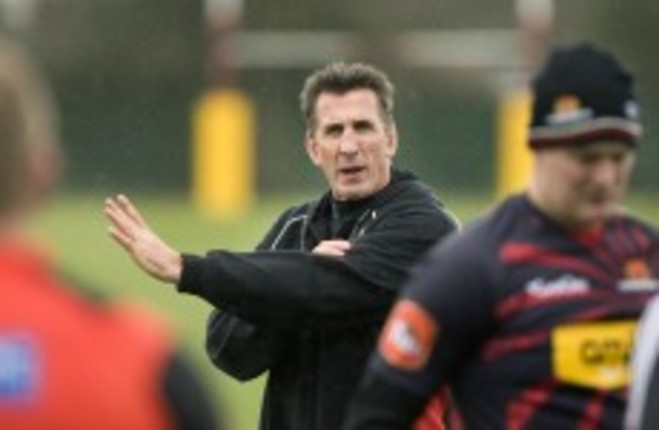Reproduced with permission from The Touchline
LIKE MANY PEOPLE, I hadn’t heard much about Rob Penney before his name was linked to the Munster job. So what qualifies the 48-year-old New Zealander for the job?
It appears that his sustained success at provincial level in New Zealand, coupled with a strong record of youth development is what swayed the ‘powers that be’ in Munster.
Based out of the Burnside Rugby Club in Christchurch, Penney’s representative playing career consisted of 101 games for Canterbury between 1985 and 1994.
He was a No 8 and captained the province for the ’92 and ’93 seasons. In 1991, he trialled for the All Blacks. A certain Zinzan Brooke was the man in possession of the No 8 jersey at that stage though. The likes of AJ Whetton, Michael Jones and Mark Carter made the back-row a fiercely competitive place and Penney missed out on an international cap.
Following his retirement in ’94, Penney took a year away from the game before moving into the back-room side of things as chief executive of the Marlborough Rugby Union in ’96. Penney stayed with the regional side until ’99. Interestingly, the Marlborough Union went on to be amalgamated with the Nelson Bay Union in 2005. The product would later become one of Penney’s ITM Cup rivals — the Tasman Makos.
Youth and young manhood
1999 saw Penney move to the position of head of provincial development for Canterbury. This role was basically the equivalent of the Academy Manager role in Munster. Penney’s job brief involved developing and producing young players for the Canterbury ITM Cup (then called the National Provincial Championship) side, and eventually the Crusaders Super Rugby side. In 2003, Penney moved up to the role of assistant coach under Aussie McLean. He continued to work hard at the development of youngsters despite the promotion.
The NPC trophies won in 2001, under current All Blacks boss Steve Hansen, and 2004, under current All Blacks defence coach McLean, featured many of the youngsters Penney had worked with. The likes of Corey Flynn, Caleb Ralph, Norm Maxwell and even Leinster’s scrum coach Greg Feek came through at Canterbury during Penney’s time in charge, going on to represent the All Blacks. Clearly, the Burnside man was making big contributions to Canterbury’s success.
ITM Cup Final 2010 Highlights:
YouTube credit: ruggerdump
This was recognised when Penney was drafted into the Crusaders Super 12 coaching team in 2005. Canterbury are basically a feeder region for the Crusaders, along with the Buller, Mid-Canterbury, South Canterbury, Tasman and West Coast unions. This was a definite step up for Penney’s coaching career. His main duty was the Crusaders’ lineout. Working with a pack that included Richie McCaw, Reuben Thorn and Chris Jack would have made it an enjoyable experience.
The Crusaders won the 2005 Super 12, beating the Waratahs 35-25 in the Grand Final. Penney’s contribution was again apparent and Canterbury recognised it by appointing him Head Coach in 2006. It took Penney two years to build the side in his own vision. By 2008 the NPC had become the Air New Zealand Cup and Canterbury had reclaimed the crown for the first time since ’04, after a gripping 7-6 win over Wellington in the final. Penney’s record of bringing young players through once again paid dividends as Kieran Read captained the side and Colin Slade was top points scorer.
Silverware
For the next four years the success continued, bringing four consecutive titles. The tournament changed sponsor in 2010 to become the ITM Cup, but the winning mentality at Canterbury remained. During the 2009 final, a 28-20 win over Wellington, another academy product, Stephen Brett, made a big impact at outhalf.
In the same team were Munster’s Pete Borlase and Casey Laulala. In 2010, young academy products again made the difference, with Ryan Crotty and Matt Todd scoring tries in the 33-13 win over Waikato.
The 2011 final saw a solid 12-3 win, again over Waikato. Tyler Bleyendaal and Tom Taylor both burst into the side in the number 10 jersey during the season. Both have since progressed to the Crusaders set-up. Taylor’s recent form has meant Dan Carter being shifted to inside centre. The major point is that Penney has a genuine ability and record at bringing through outhalfs (outhalves?). That bodes well for Munster as Ronan O’Gara approaches the final years of his career.
His work with young player development was recognised by the the NZRU in November of 2011, when they appointed him Head Coach of the U20 All Blacks, replacing Ulster-bound Mark Anscombe. Penney has committed himself to taking the U20 side to the Junior World Championship in South Africa this coming June. The exclusions of Chiefs flanker Sam Cane and Hurricanes scrumhalf TJ Perenara mean it’s the first time New Zealand will defend their title without any players returning from the previous season. They will still be amongst the favourites.
Penney is expected to arrive in Munster in July for the start of a new era at the province. Anthony Foley is to continue as forwards coach, while an announcement on a new backs’ coach is expected soon.
It’s clear what Penney brings: an undeniably strong record of developing young players; lineout organisation skills; and most importantly, a winning mentality.
His job over the next two years is to get Munster back to where they belong.

